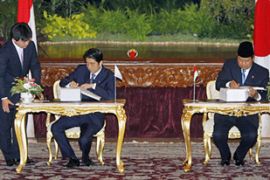Japan and Indonesia sign trade pact
More than $7bn of Japanese investment in Indonesia planned over next five years.

The trade deal signed on Monday requires Indonesia to provide LNG to Japan, even when events such as new regulations force it to cut exports.
In return, the pact provides a framework to encourage Japanese investment in energy development projects in Indonesia.
Fujio Mitarai, chairman of the Japan Business Federation, who is part of Abe’s delegation, said: “More than 800 yen or $7bn of total investment is planned over the next five years.”
He said sectors planning the investment included “energy, including oil and gas, and machinery, including automobiles”.
About 62 per cent of Japanese investment in Indonesia is through the manufacturing sector.
Climate change
Susilo Bambang Yudhoyono, Indonesia’s president, told a news conference: “As for LNG, while efforting to meet domestic needs, we will strengthen our relations with Japan.”
The two countries also committed to take part in a new framework to slow the growth of greenhouse gases after the Kyoto Protocol climate change pact runs out at the end of 2012.
Indonesia will host a new round of UN climate change talks in Bali in December.
Japan relies on the Middle East for most of its oil imports and this pact with Indonesia – the second to include a provision on energy supplies after a deal with Brunei sealed in June – is part of its strategy to bolster energy security.
Indonesia is the only Opec member from the Asia-Pacific region.
Doubts remain over Indonesia’s energy pledges given that it has failed to meet its long-term LNG contractual commitments for a number of years due to depletion of its gas fields and higher local demand.
Taxes
The deal removes taxes on Indonesian exports like shrimp as well as tariff quotas on bananas and pineapples.
The agreement does not cover rice, a politically sensitive issue for Japan.
Indonesian nurses and care givers will also be allowed to work in Japan, although numbers still have not been agreed upon.
Japan’s 11th largest trading partner will also remove import taxes on auto parts and electronic equipment from Japan.
The country is a production base for Japanese automotive firms such as Daihatsu, Toyota and Nissan.
An Indonesian official said last month that Jakarta hoped to boost its non-oil and gas exports to Japan to $20bn in 2010, up from $11bn in 2006.
Indonesia imported about $8.65bn of goods from Japan in 2005, Japanese government data showed.
Abe is travelling with a delegation of about 250 Japanese business executives.
He goes to India next before winding up an Asian tour in Malaysia.